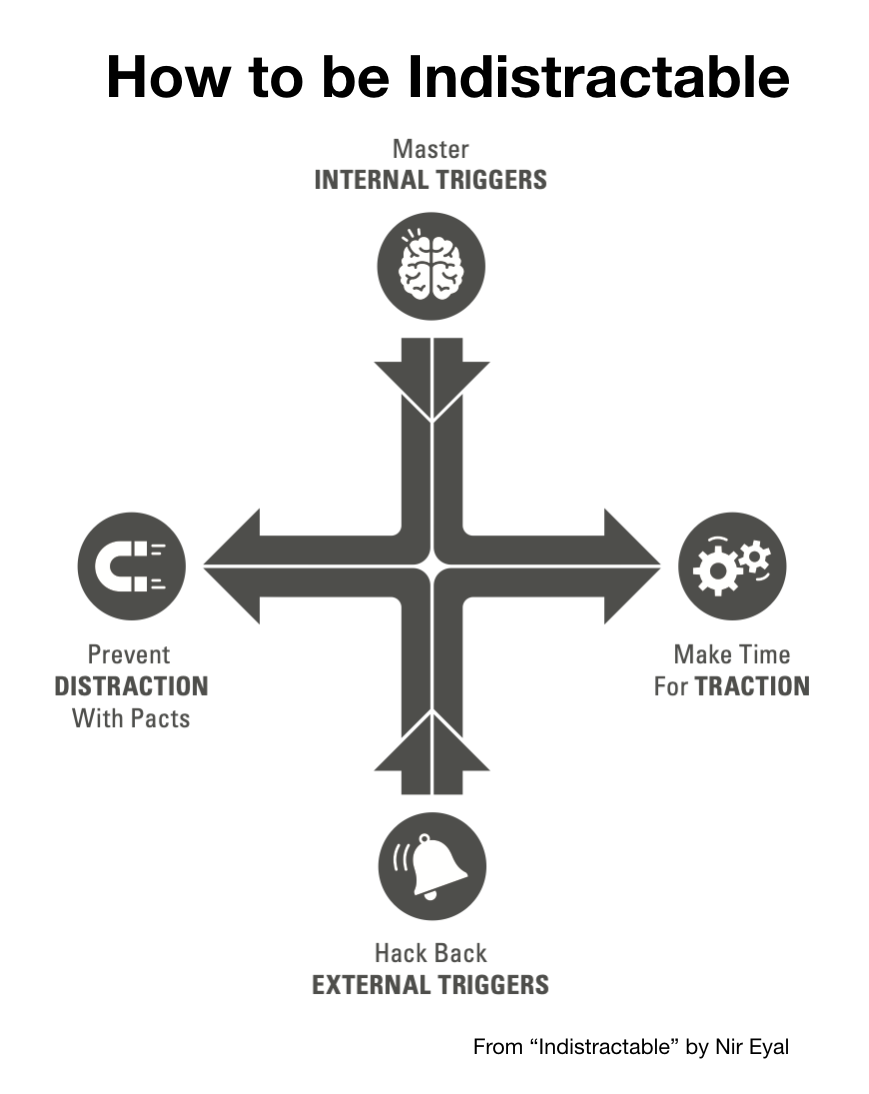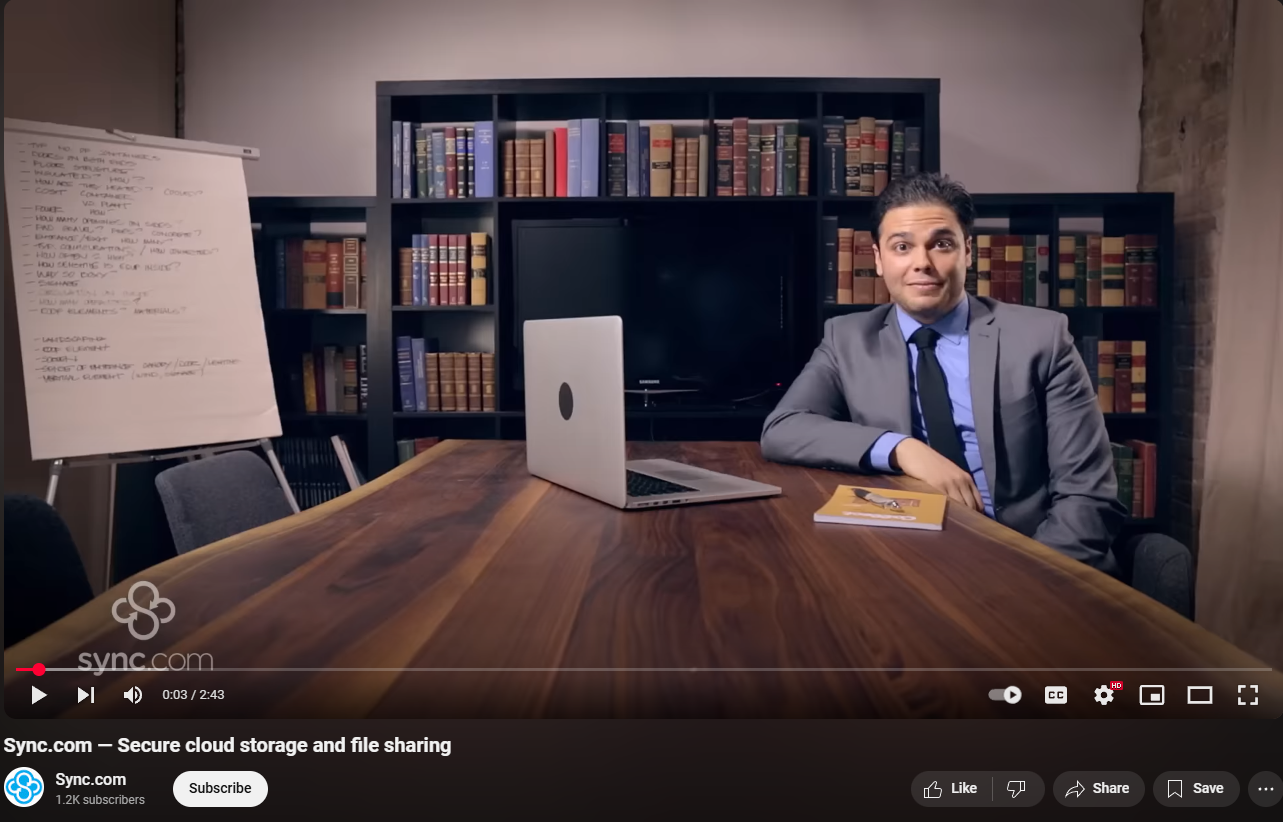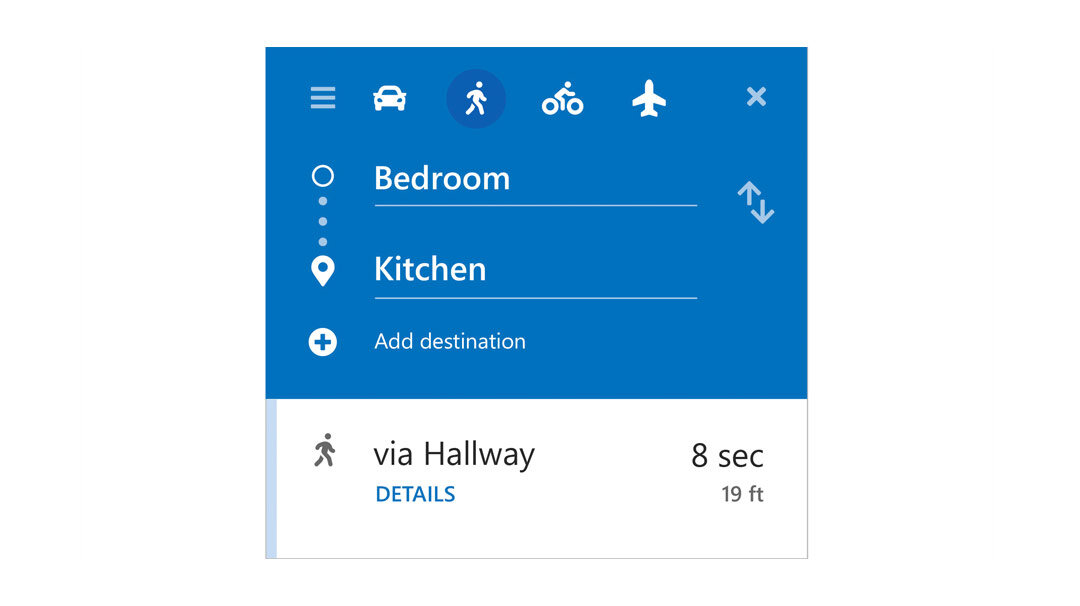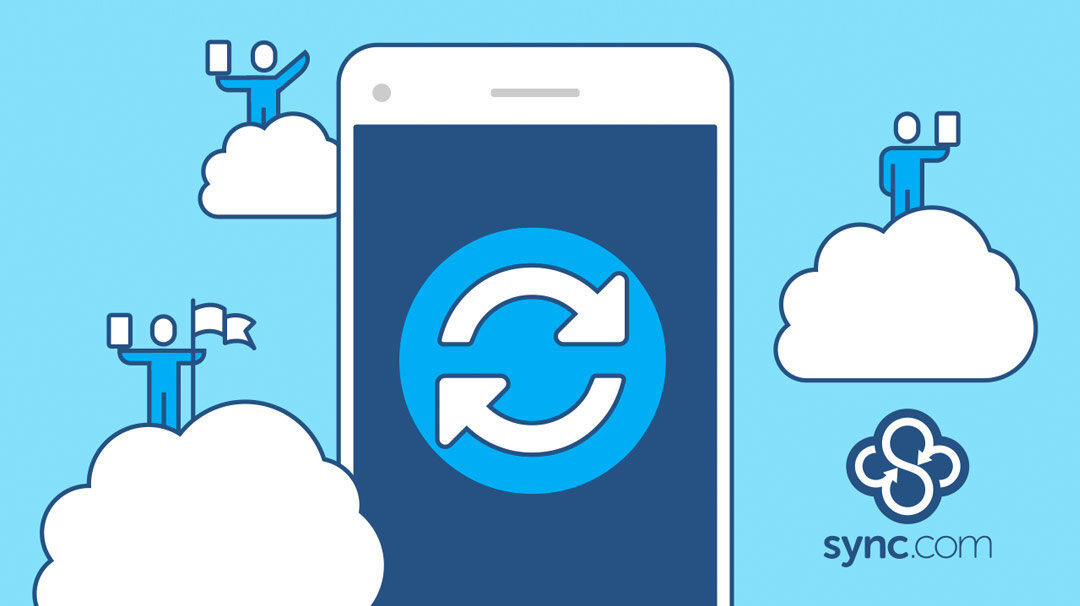How to Stop Your Distractions from Controlling Your Day
by Kristen Marano on Aug 17, 2020 12:48:52 PM

Being productive is about mastering your attention, not making to-do lists, according to Nir Eyal, author of Indistractable. Here’s how to get back on task and control your life.
This is the first interview in a new series by Sync.com called Five Questions With, in conversation with global thinkers about how we can lead better lives.
When Nir Eyal looked up from his phone and realized his daughter had left the room, he knew he had a problem. “I sent her a clear message: whatever was on my phone was more important than her.” This was only one of many distractions that Eyal, author of Indistractable: How to Control Your Attention and Choose Your Life, was using to escape uncomfortable emotions in his life. “I felt awful and it was time for me to figure out what the hell was going on.” He embarked on five years of research to become what he calls “indistractable,” so he could do what he said he was going to do: lose weight, eat healthier, and be present with his family.
While it’s not uncommon for many of us to spend time on our phones, the urge to be distracted has increased during COVID-19: putting the laundry on while working from home, checking the news more often, and spending hours on Instagram. But, Eyal says we can’t blame distraction as a character flaw. There’s something deeper happening called, internal triggers. “We’re seeking to escape uncomfortable sensations,” says Eyal. “It’s the desire to escape discomfort whether you’re feeling bored, lonely, tried, anxious, or stressed.”
If distraction is any action that pulls you away from what you plan to do, then traction is an act that you plan with intent and aligned with your values. We’ll still get distracted sometimes, but we can arm ourselves with techniques to get back on task. “It’s the skill of the century.” We recently spoke with the author to find out how we can leave the office at the end of the day and stop worrying about work:
Kristen Marano: COVID-19 has created a work from home culture. Why do we tend to be more distracted at home than in the office?
NE: With the stress and anxiety and fear and uncertainty that COVID-19 is causing, we’re looking for a way to escape discomfort. People look to escape discomfort by thinking, “well, if I read the news or check Twitter, I’ll find that relief from my emotional discomfort. For some people, it’s too much news; for others it’s too much booze.
Our schedules have blown up. I read an article a few days ago that Google is seeing an increase in the number of people searching, “what day is it?” [laughs]. There’s a market increase in people searching that question, because the structure of our days has evaporated and for many people, that’s dizzying. Søren Kierkegaard said, “anxiety is the dizziness of freedom.” Because our day has so much freedom, we’re becoming anxious. When we decide our schedule, we perform better than when our schedules are imposed by other people.
We have new external triggers. External triggers are the pings, dings, and rings in our outside environment that can lead us towards distraction. The norm used to be that we were distracted because our co-worker stopped by our office and said, “hey, did you hear the office gossip?” and that would take us off track. Now, it’s not our colleagues, it’s our kids.
We’re feeling more internal triggers throughout our day. If you keep checking the news looking for a way to calm your anxiety, you’re only going to be more anxious. Based on what news you read, media companies are in business to keep you reading the news. We need to be aware.
Don’t blame or shame yourself for being distracted. Claim responsibility
KM: How do we identify our internal triggers?
NE: Mastering the internal triggers is the first and most important step of four to becoming indistractable. We want to break mindless habits like, “I’m bored: let me turn on the TV. I feel lonely: let me check Facebook. I feel uncertain: let me check the news.” We can’t break these habits before we recognize, “what is this ugly, uncomfortable sensation that I’m trying to escape?
The techniques we can use fall into three buckets: mastering the trigger, mastering the task, and mastering our temperament. I’ll pick one of the techniques I use all of the time: it’s called surfing the urge.
Most people when they become distracted fall into two buckets: the blamers or the shamers. The blamers blame things outside of themselves, “it’s the technology that’s addicting me. It’s the news. It’s my boss.” You can’t change that stuff.
The shamers take it on the inside. They shame themselves, “oh, there must be something wrong with me. Maybe I have ADD. There’s something broken in my brain.” The shame cycle leads to more internal triggers, which makes us more likely to escape the discomfort with distraction.
We don’t want to be shamers. We don’t want to be blamers. We want to be claimers.
Claimers take responsibility and acknowledge that these distractions aren’t your fault. You didn’t invent Facebook. You didn’t invent the news. It’s not your fault, but it’s your responsibility. You can’t control the urge to smoke a cigarette, check the email, or scroll through the news. What you can control is what you do in response to the urge.
The 10-minute rule: resist the urge to be distracted
Don’t use abstinence to resist an urge, because it can backfire. Instead, we can tell ourselves, “I’ll give into the distraction, but not right now.” This is called the 10-minute rule: we can do whatever we have the urge to do, but in 10 minutes. We set a timer, put it down, and for those 10 minutes we have a choice to make: we can either get back to the task or bring awareness to that sensation with curiosity rather than contempt. Contempt would be blaming and shaming. Curiosity is about exploring that sensation: “where is the urge coming from? What am I experiencing in my life right now?” Jot down some of those sensations and sit with them for a few minutes. Nine times out of 10, when that 10 minutes is up, you’ll already have resumed work and effectively disarmed the internal trigger.

To-do lists are bad productivity advice. Instead, plan your time
KM: How can we manage unexpected events or asks that come up during the day?
NE: If there’s a mantra for this book it is, “the antidote to impulsiveness is forethought.” We want to take time in advance to create our calendar, called time-boxing. Once we start the day, we need to follow the calendar. Everything that’s not in our calendar is a distraction.
People I’ve interviewed in executive roles, do this already. They have someone who manages their calendar and they plan out their day. What they don’t do, but what most of us do, is let their to-do list run their day.
Most people think good productivity advice is to keep a to-do list and tick off items. The problem with to-do lists is that we never finish everything on the list. It’s a broken process; if you bought an iPhone at the store and you brought it home, and it crashed every day, you’d take it back and say, “this is a defective phone.”
Instead, plan your time. If you want to go on social media, put it in your calendar. If you want time to check the news, put it in your calendar. If you want time with your kids, to meditate, to play video games, and to watch Netflix, you don’t have to feel guilty anymore. What you’re doing is turning distraction into traction by planning the time in your day to do exactly what you said you were going to do, especially the fun stuff.
People quit hard work because they get in their own way
KM: I sense good habits are driven by doing work we’re passionate about. The idea is that being less distracted comes from being interested and energized.
NE: Yes and no. We over value this troupe of you’re supposed to love your work and follow your passion; that’s unrealistic for most people. If your job sucks and year-after-year you’ve tried and it’s not for you, okay. Not everyone is well suited to every job.
Too many people give up too soon, because at the first bump of difficulty – watching YouTube videos instead of doing hard work – they say to themselves, “oh, I must not be passionate about this. This isn’t my purpose.” Bullshit [laughs].
Everything worth having is worth working hard for. If it was easy, everyone would do it. This is why becoming indistractable is the skill of the century. People don’t quit because they don’t have the capacity; they quit because they keep getting in their own way.
Teaching others leads us to become indistractable
KM: Let’s talk about using, “I am statements,” like “I am indistractable,” or “I am capable of being productive today,” as a way to believe in ourselves and get work done.
NE: The science around affirmations or vision statements shows that they don’t work well. There are several studies that show having an identity or a moniker help us conform to our goals.
This comes from the psychology of religion that when someone calls themselves a particular faith, it’s easier to do what they say they’re going to do. Or a moniker of being a vegetarian. If someone says, “I’m a vegetarian,” they don’t wake up in the morning and say, “oh, I’d love to eat bacon right now.” No, a vegetarian doesn’t eat meat. A moniker creates a dark red line of, “this is what I’ll do and what I won’t do because of who I am.”
One of the most effective things we can do to become indistractable is to teach others. We know this from the psychology of religion. Every religion has an element of conversion, of prophesizing or spreading the faith. And, when you convert others you solidify your own belief, “if I say one thing, I have to act in accordance with what I say.” If I preach to others, I’m more likely to become that attribute myself. That’s why I call the book indistractable; the book sounds like indestructible. It’s meant to sound like a super power; it’s meant to sound like an identity.
‘We need to make it socially unacceptable to check our phones.’
When I was a kid in the early 80s, we had ashtrays in our house. My parents didn’t smoke, but when someone came to our house they expected to smoke.
Now, can you imagine if someone walked into your house and lit up a cigarette in the living room? No one would dream of doing that now. What changed? We have laws that say you can’t smoke in someone’s living room? No. What changed is what we call social antibodies. We started spreading these norms and manners that made bad behaviours no longer socially acceptable.
I remember when my mom took away the ashtray. When someone came over and tried to smoke, she said, “oh, I’m sorry, we’re non-smokers.” She used an identity. “If you’d like to smoke, would you be so kind to go outside?” That took guts. That was not something that was common. Now it’s the norm, but back then it took people like my mom to stand up and say, “no, this is who we are; if you don’t agree, please go outside.”
This behaviour is what needs to happen when it comes to distraction. We need to make it socially unacceptable to check your phone in the middle of a business meeting, to scroll Facebook when you’re trying to go out with friends, and to take a selfie when you’re trying to have lunch with someone.
‘The world is going to become more distracting in the years to come.’
My daughter is going to have a world that’s harder to stay focused in and do what she wants to do. It’s imperative that we teach our kids to become indistractable, and we can do that by setting a good example of being indistractable ourselves. There will be a bifurcation of people in the future between those who let their time and attention be controlled by others, and people who say, “no, I control my time and attention; I decide what I pay attention to, and I control my life because I am indistractable.”
- September 2025 (3)
- August 2025 (1)
- July 2025 (3)
- June 2025 (1)
- May 2025 (1)
- April 2025 (1)
- February 2025 (2)
- January 2025 (1)
- December 2024 (1)
- November 2024 (2)
- October 2024 (5)
- September 2024 (6)
- August 2024 (3)
- July 2024 (6)
- June 2024 (4)
- May 2024 (4)
- April 2024 (7)
- March 2024 (4)
- February 2024 (5)
- January 2024 (5)
- December 2023 (1)
- November 2023 (3)
- October 2023 (3)
- September 2023 (2)
- August 2023 (5)
- July 2023 (2)
- June 2023 (4)
- May 2023 (2)
- March 2023 (2)
- February 2023 (1)
- January 2023 (3)
- December 2022 (1)
- November 2022 (3)
- October 2022 (2)
- August 2022 (3)
- July 2022 (1)
- June 2022 (1)
- May 2022 (2)
- April 2022 (1)
- March 2022 (2)
- January 2022 (4)
- December 2021 (2)
- October 2021 (3)
- September 2021 (3)
- August 2021 (1)
- July 2021 (5)
- June 2021 (4)
- May 2021 (3)
- April 2021 (4)
- March 2021 (5)
- February 2021 (2)
- January 2021 (5)
- December 2020 (1)
- November 2020 (2)
- September 2020 (1)
- August 2020 (1)
- July 2020 (1)
- May 2020 (1)
- April 2020 (1)
- March 2020 (3)
- February 2020 (1)
- November 2019 (1)
- October 2019 (1)
- August 2019 (1)
- May 2019 (1)
- April 2019 (1)
- February 2019 (1)
- January 2019 (2)
- December 2018 (1)
- October 2018 (2)
- September 2018 (4)
- June 2018 (1)
- May 2018 (1)
- March 2018 (1)
- January 2018 (2)
- December 2017 (2)
- November 2017 (2)
- September 2017 (1)
- August 2017 (2)
- May 2017 (2)
- April 2017 (1)
- January 2017 (2)
- July 2016 (3)
- June 2016 (3)
- February 2016 (1)
- November 2015 (1)
- September 2015 (1)
- August 2015 (4)
- May 2015 (4)
- January 2015 (2)
- October 2014 (1)
- September 2014 (1)
- August 2014 (2)
- July 2014 (5)
- June 2014 (2)
- March 2014 (1)
- December 2013 (1)
- October 2013 (1)
- September 2013 (1)
- July 2013 (4)
- June 2013 (2)
- April 2013 (1)
- February 2013 (1)
- January 2013 (1)
Subscribe by email
You May Also Like
These Related Articles

Take Back your Privacy!

COVID-19 got you Down? 6 Ways to Fight Pandemic Fatigue and Stay Positive
